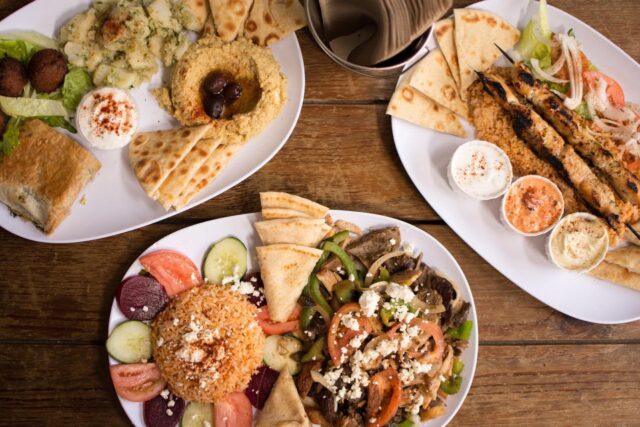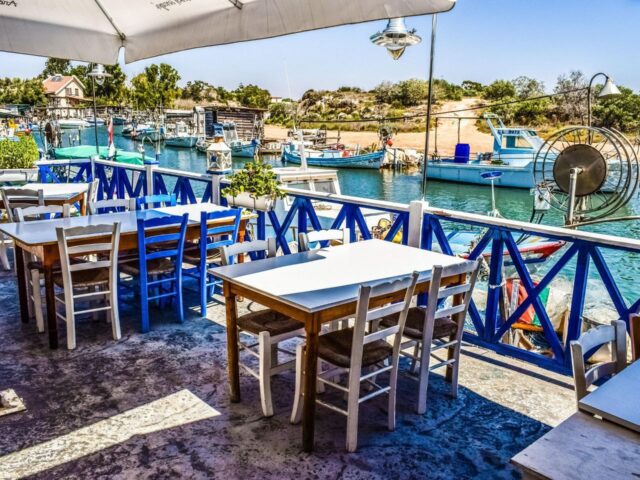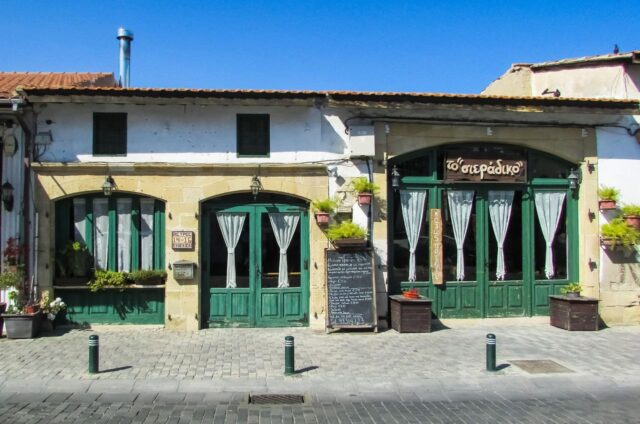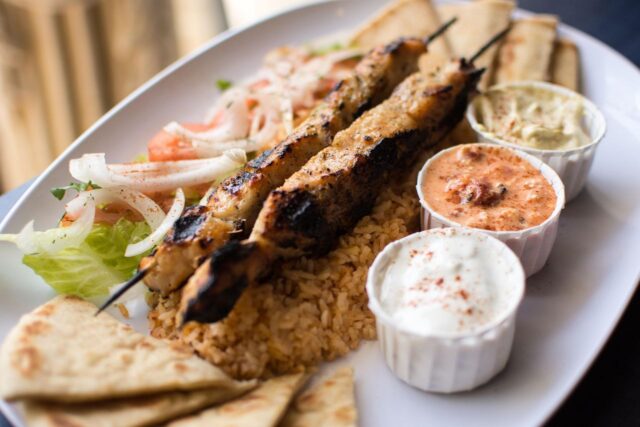Cyprus is an island where cuisine has become part of the national identity. Greek, Middle Eastern, and European traditions blend here, creating a rich and diverse culinary palette. Cyprus’s restaurants are renowned not only for the taste of their dishes, but also for their atmosphere, hospitality, and respect for the local produce. From street tavernas to sophisticated fine dining establishments, every meal becomes a cultural experience.

Contents
The Culinary Heritage and Philosophy of Cypriot Cuisine
The foundation of Cypriot gastronomy is simplicity, freshness, and balance. Local chefs use seasonal, sun-grown produce: olive oil, lemons, herbs, vegetables, seafood, and meat. The guiding principle is nothing superfluous, everything natural.
Cypriot cuisine reflects its history: Greek traditions blend with Middle Eastern, British, and even Italian influences. That’s why Cypriot restaurant menus feature moussaka, kebabs, pasta, and fresh oysters.
Almost every establishment serves meze —a set of dozens of small dishes that reveal the full flavor of Cypriot cuisine.
Types of restaurants in Cyprus
There are several categories of establishments on the island, differing in atmosphere and concept.
- Taverns (tavernas) are traditional family-run restaurants serving home-cooked dishes. They are typically located in villages or old towns. The atmosphere is cozy, with live music and homemade wine.
- Contemporary restaurants fuse tradition and culinary innovation. Here you can sample fusion menus with elements of French, Asian, and Peruvian cuisine.
- Fine dining restaurants are rare, but Cyprus has several award-winning establishments for their signature dishes and wine lists.
- Street cafes and grill bars are popular among locals, serving souvlaki, gyros, sheftalia, and other charcoal-grilled dishes.
- Fish taverns are coastal establishments specializing in fresh fish and seafood. The menu often depends on the morning’s catch.

Geography of restaurants
Each region of Cyprus offers its own gastronomic flavor.
- Limassol is the capital of gourmets. It boasts a concentration of fine waterfront restaurants, wine bars, and signature cuisine. Special attention is paid to seafood and local wines.
- Nicosia is a city of contrasts, where ancient taverns stand side by side with modern, Art Nouveau restaurants. Here you can sample both traditional meze and international dishes.
- Paphos is a resort with a romantic atmosphere. Restaurants are often located in old buildings, on terraces overlooking the sea and sunset. They serve fresh fish, octopus, and lamb.
- Ayia Napa and Protaras are the hubs of summer life. During the day, cafes serving light meals and ice cream are open, while in the evening, restaurants come alive with international menus, steaks, sushi, and wine.
- The mountain villages of Troodos and Lefkara are the perfect place to sample authentic home-cooked cuisine. The menu includes goat meat, fried sausages, beans in tomato sauce, and local wine.
- Larnaca is a city of relaxed seaside dining. Along the Finikoudes promenade, cozy tavernas offer fish dishes and Cypriot cuisine.

What to try in Cyprus restaurants
Cypriot cuisine is rich in flavors and aromas. Every restaurant offers dishes that are essential to the island’s cuisine:
- Sheftalya are meat cutlets in a casserole, fried over coals.
- Stifado is a slow-simmered meat stew with onions and wine.
- Kleftiko is lamb baked in a clay oven with herbs.
- Souvla and souvlaki are kebabs made from large and small pieces of meat.
- Halloumi is a famous Cypriot cheese, served fried or fresh.
- Moussaka is a casserole made with eggplant, potatoes and meat sauce.
- Taramasalata, tzatziki, and tahini are traditional sauces included in meze.
- Loukoumades are small honey-dipped doughnuts, often served in cafes and as a dessert.

Almost all dishes are served with bread or pita, and it is customary to accompany them with a glass of house wine.
Drinks and wines
Cyprus is one of the oldest wine-producing regions in the world. Many restaurants offer their own wines, as well as collections from local wineries such as Vouni Panayia, Tsiakkas, Zambartas, and Vlassides.
Traditional drinks are also popular:
- Commandaria is the oldest dessert wine in the world;
- Zivania is a strong grape distillate served as an aperitif;
- Cypriot beer Keo and Leon, ideal for grilled dishes.
Premium restaurants are increasingly pairing tasting sets with local wines, turning dinner into a gastronomic event.
Food culture
In Cyprus, a meal is more than just a meal; it’s an act of communication and savoring the moment. Dinner can last for hours: appetizers follow hot dishes, wine is served, and conversations seamlessly transition to music.
Locals rarely dine in a rush—restaurants are seen as a place to relax, where it’s important not only to enjoy a delicious meal but also to spend time in company. Even in tourist areas, the spirit of family hospitality remains: waiters greet you by name, explain the history of the dishes, and offer you a dessert “made by the chef.”
Modern trends
Cyprus’s modern restaurant scene is rapidly developing. Young chefs are experimenting with presentation methods and implementing the “farm-to -table” concept, using ingredients from local farmers.
Vegetarian and vegan restaurants are rapidly expanding, especially in Limassol and Nicosia. Establishments specializing in healthy eating, Mediterranean smoothies, and sugar-free desserts are increasingly popping up.
At the same time, traditional taverns remain unchanged – they continue to cook according to ancient recipes passed down from generation to generation.
Prices and service level
Prices in Cypriot restaurants vary depending on the format:
- Taverns and grill bars – 15–25 euros per person.
- Seafood restaurants – 25-40 euros.
- Signature and premium establishments – from 50 euros and up.
Service is usually included in the bill, but a tip of 5-10% is welcome as a token of gratitude.
Why you should visit the restaurants of Cyprus
Cyprus’s restaurants offer more than just delicious food; they also offer a way to experience the island’s rhythms. Here, the sea, sun, the aromas of herbs, and a genuine attitude toward guests come together.
Every meal becomes a celebration: whether it’s a dinner by the sea with a glass of Commandaria, a meze tasting in a mountain tavern, or morning coffee and cake in the old quarter of Nicosia.
The gastronomy of Cyprus is the story of the island told through the language of taste.

















